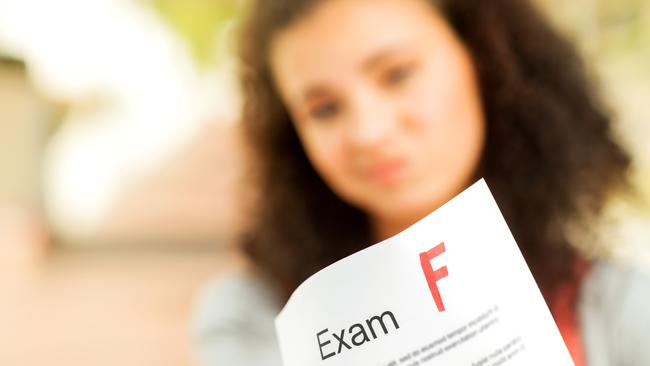High school pass marks lowered to under 50 per cent
A pass mark used to be 50, yet new data reveals schools are passing Year 12 students who flunk 60 per cent of assignments and exams.

Struggling Year 12 students who fail exams and assignments are still passing maths and English subjects, as state curriculum bodies push down pass marks to below 50 per cent.
In results that raise questions about teaching and syllabus standards, fresh “grade boundary” data from the Queensland Curriculum and Assessment Authority (QCAA) shows that Year 12 students scored a “C” pass-mark in specialist maths with an overall mark of 47 out of 100 last year.
In maths methods, a prerequisite for engineering, the pass mark was 45 out of 100 – the same as for base-level general maths.
In physics, students needed just 49 marks per cent to pass, while English students passed the subject with just 41 marks out of 100.
And Victoria’s “score ranges’’ for coursework units and written exams for each subject in 2021 reveal students could pass some of the final Year 12 science, maths and English exams despite getting two out of three questions wrong.
Teacher shortages are being blamed for the poor results, as schools struggle to find enough teachers with university qualifications in the hard-to-staff maths and science subjects.
Up to 40 per cent of Australian maths students are being taught by teachers who did not specialise in the subject during their four-year education degree at university.
Senior maths and science academics and teachers warned yesterday that too many students are leaving Year 12 without the necessary maths skills, blaming both teaching standards and the curriculum.
Professor Jennifer Stow, an eminent researcher at the University of Queensland’s Institute of Molecular Bioscience, said she was “hugely concerned’’ about falling standards among high school maths graduates and criticised “what is being taught and how it’s being taught’’.
“I think students aren’t being taught enough basics in maths to give them a good underpinning to build upon at a higher education level,’’ she said. “Assignments don’t teach them formulae or maths rules or how to do calculations – they are being assessed on assignments that anyone can mark. They should be drilled on maths rules and formulae, and shown the way to do things.’’
Maths teacher Dr Stephen Norton, who spent 15 years teaching mathematics to trainee teachers at Griffith University before returning to the classroom this year, said many students were finishing primary school without knowing their times tables, long division and multiplication, or fractions.
“When they get to high school they’re cactus,’’ he said.
“The biggest problem in secondary school is you get a whole bunch of kids coming to school in Grade 7 with the knowledge of Grade 4 or 5.
“For some of them, if you ask, ‘What’s seven multiplied by six?’ they can’t do it.
“They don’t know how to multiply, they haven’t been taught long division and they can’t add or multiply fractions.’’
Dr Norton said high school teachers were required to teach to a detailed curriculum so quickly that they did not have time to help students catch up on basic concepts.
“If you’ve got a struggling kid, or a kid who hasn’t quite got it, they will fall behind quite quickly,’’ he said.
Dr Norton said the best way to improve students’ maths results would be to ensure primary school teachers are given more training to teach the subject.
“The primary school teachers are so poorly prepared by universities,’’ he said.
Queensland is the only state to publish subject-level grade boundaries, which show that in maths methods, a prerequisite for engineering, the pass mark for Year 12 last year was 45 out of 100 – the same as for base-level general maths. In physics, students needed just 49 marks per cent to pass, while English students passed the subject with just 41 marks out of 100. In biology, the lowest pass mark for a C grade was 48, while in chemistry it was 50, and 44 in modern history.
In Victoria in 2021, the pass mark for the final written exam in biology was 108 out of a possible 240 marks – an effective pass mark of 45 per cent.
In chemistry, the lowest score for a C mark was 78 out of 240 – a pass mark of 32 per cent.
Maths methods had a pass score of 50 out of 160 in the mathematical methods exam, revealing that students answered just one in three questions correctly.
In specialist maths, the pass rate for the written exam was 35 out of 80 marks, meaning students could pass despite failing 56 per cent of the questions.
In the English exam, the lowest score was 26 out of 60 marks – a 40 per cent pass rate.
The Victorian Curriculum and Assessment Authority did not respond to The Australian’s requests for comment.
A QCAA spokesman said that a grade of C “matches the objectives of the course and is considered ‘satisfactory’.’’
“Every year we look at the achievement of students to determine the grade boundaries,’’ he said. “This involves the QCAA and expert teachers looking at student performance across their range of assessments in every subject to determine cut-offs that align to each reporting standard on a 100-point scale.
“If the range for a C in a subject is 45-64 marks, it is because the student work that received marks in this range demonstrated the attributes of a C standard as described in the syllabus.
Dr Kevin Donnelly, a senior English teacher, curriculum writer and academic who reviewed the national curriculum in 2014, said Australia set a “low bar’’ for education. “We’ve lowered the bar to create a false picture of how well our students are doing and it breeds complacency,’’ he said.




To join the conversation, please log in. Don't have an account? Register
Join the conversation, you are commenting as Logout